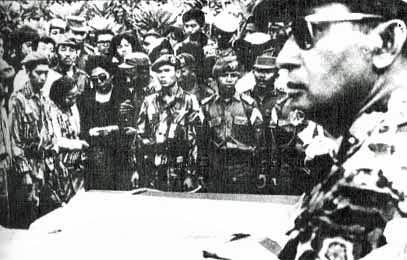|
Nasakom
Guided Democracy () was the political system in place in Indonesia from 1959 until the New Order began in 1966. It was the brainchild of President Sukarno, and was an attempt to bring about political stability. Sukarno believed that the parliamentarian system implemented during the liberal democracy period in Indonesia was ineffective due to its divisive political situation at that time. Instead, he sought a system based on the traditional village system of discussion and consensus, which occurred under the guidance of village elders. With the declaration of martial law and the introduction of this system, Indonesia returned to the presidential system and Sukarno became the head of government again. Sukarno proposed a threefold blend of (nationalism), (religion), and (communism) into a co-operative Nas-A-Kom or Nasakom governmental concept. This was intended to satisfy the four main factions in Indonesian politics—the army, the secular nationalists, Islamic groups, a ... [...More Info...] [...Related Items...] OR: [Wikipedia] [Google] [Baidu] |
Indonesian Mass Killings Of 1965–66
The Indonesian mass killings of 1965–66, also known as the Indonesian genocide, Indonesian Communist Purge, or Indonesian politicide ( id, Pembunuhan Massal Indonesia & Pembersihan G.30.S/PKI), were large-scale killings and civil unrest primarily targeting members of the Communist Party of Indonesia (PKI). Other affected groups included communist sympathisers, Gerwani women, ethnic Javanese Abangan, ethnic Chinese, atheists, alleged " unbelievers" and alleged leftists. It is estimated that between 500,000 to 1,000,000 people were killed during the main period of violence from October 1965 to March 1966. The atrocities were instigated by the Indonesian Army under Suharto. Research and declassified documents demonstrate the Indonesian authorities received support from foreign countries such as the United States and the United Kingdom. It began as an anti-communist purge following a controversial attempted ''coup d'état'' by the 30 September Movement. According to the most ... [...More Info...] [...Related Items...] OR: [Wikipedia] [Google] [Baidu] |
Sukarno
Sukarno). (; born Koesno Sosrodihardjo, ; 6 June 1901 – 21 June 1970) was an Indonesian statesman, orator, revolutionary, and nationalist who was the first president of Indonesia, serving from 1945 to 1967. Sukarno was the leader of the Indonesian struggle for independence from the Dutch colonialists. He was a prominent leader of Indonesia's nationalist movement during the colonial period and spent over a decade under Dutch detention until released by the invading Japanese forces in World War II. Sukarno and his fellow nationalists collaborated to garner support for the Japanese war effort from the population, in exchange for Japanese aid in spreading nationalist ideas. Upon Japanese surrender, Sukarno and Mohammad Hatta declared Indonesian independence on 17 August 1945, and Sukarno was appointed president. He led the Indonesian resistance to Dutch re-colonisation efforts via diplomatic and military means until the Dutch recognition of Indonesian independence ... [...More Info...] [...Related Items...] OR: [Wikipedia] [Google] [Baidu] |
Acting Presidency Of Suharto
The acting presidency of Suharto followed the transition to the New Order in which Army General Suharto assumed presidential powers to "restore" law and order following the now-disputed attempted coup which led to anti-communist purges. The term lasted from 12 March 1967 until 27 March 1968, when Suharto was officially inaugurated as the definitive President of Indonesia. Election to the acting presidency By February 1967, President Sukarno realized that his political career was at an end and he became concerned at cutting his losses. On 7 February, he sent a letter to Suharto saying that he was willing to hand over the running of the government to the General but also added that he would like to continue on as head of state. In the time between the arrival of that letter and the formulation of the reply, the People's Representative Council (DPR) passed a resolution which called for a Special Session of the Provisional People's Consultative Assembly (MPRS). Suharto, accompan ... [...More Info...] [...Related Items...] OR: [Wikipedia] [Google] [Baidu] |

